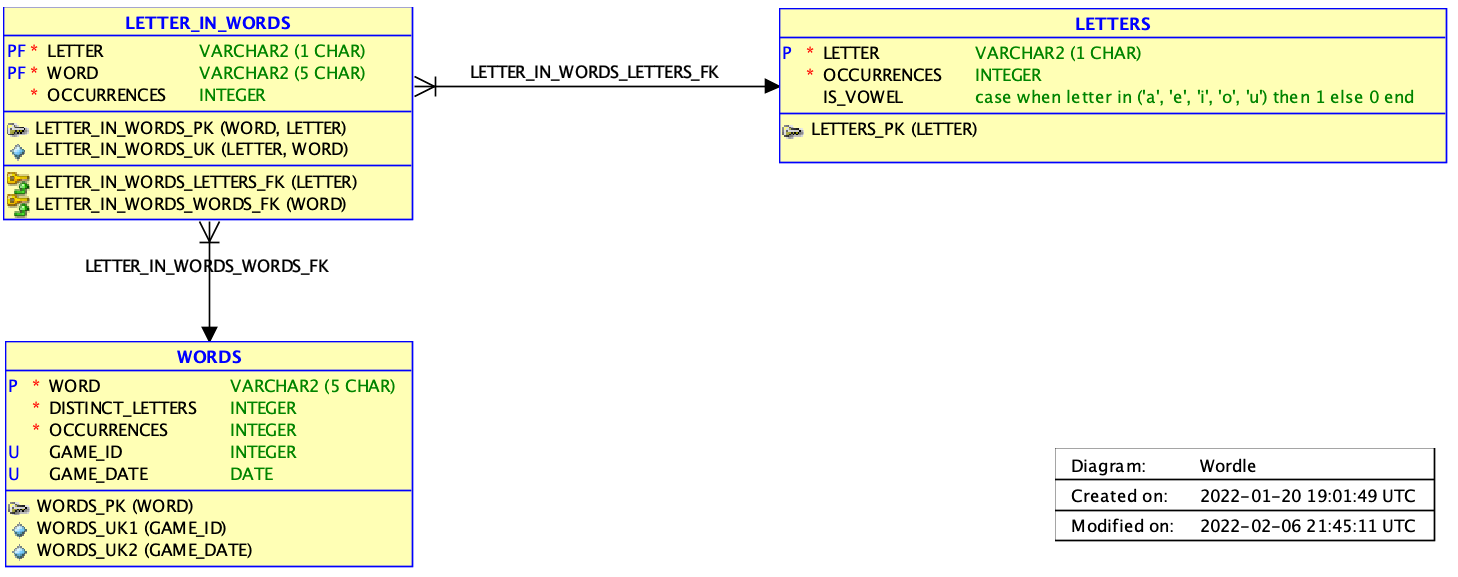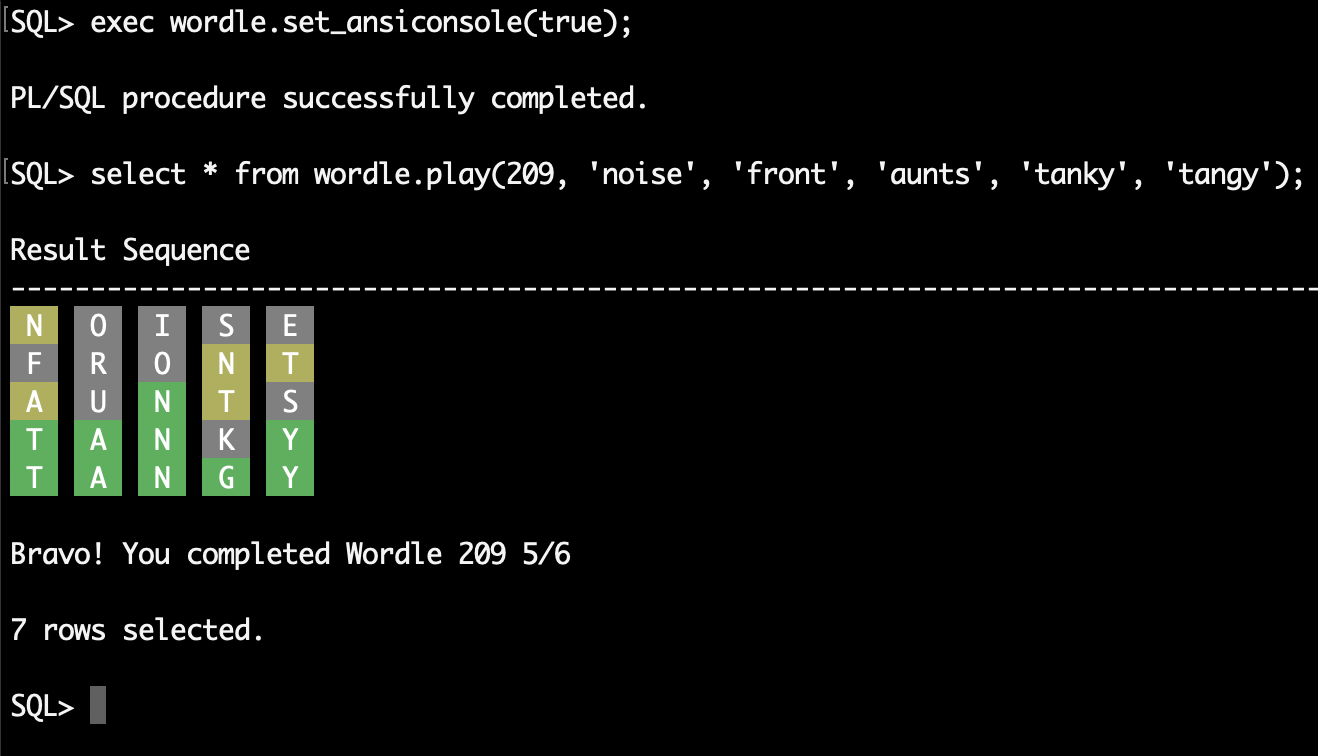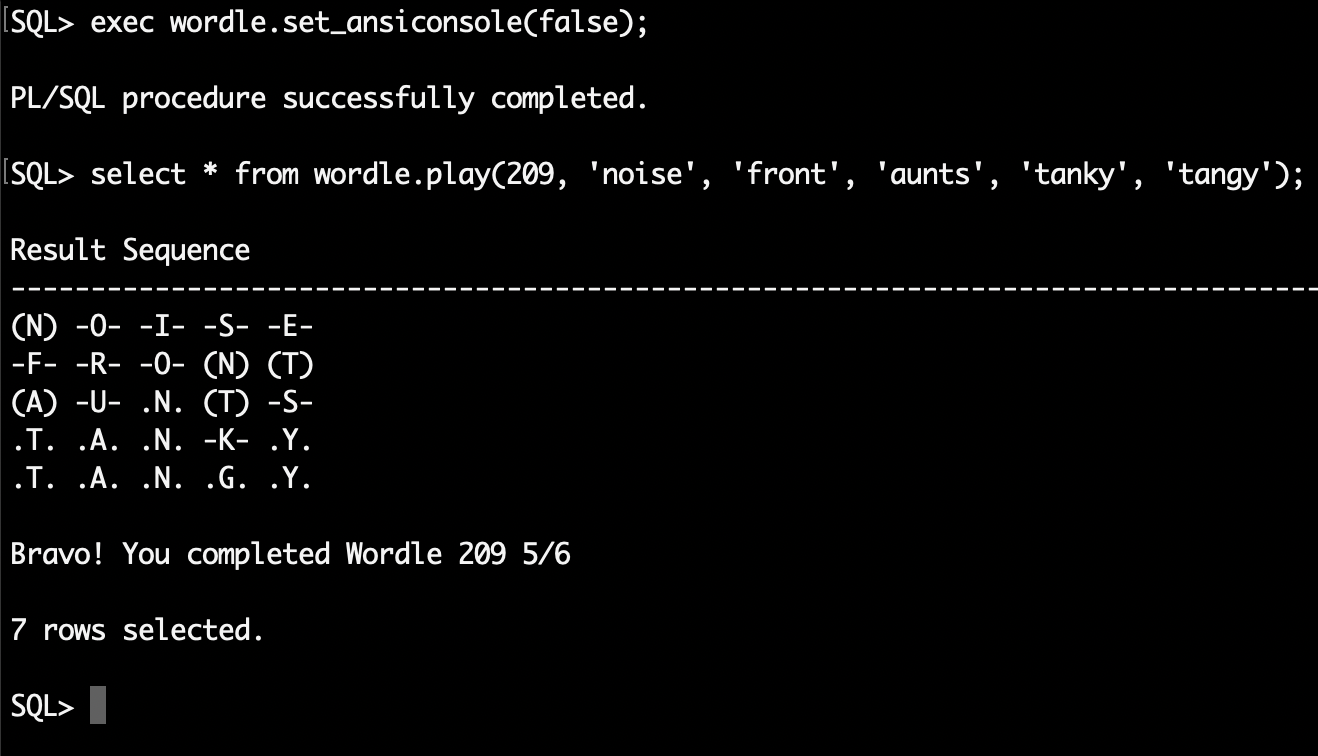This is an implementation of Josh Wardle's Wordle in the Oracle Database using SQL and PL/SQL. This solution uses the same data. Starting with game #0 on 2021-06-19 on a daily basis.
You can play past, current or future games. The solution is implemented with a set of table functions. The table function wordle.play helps guessing and visualizes the results. The table function wordle.autoplay plays a game automatically for you. It uses the first suggestion until it finds a solution. Sometimes it takes more than the forseen 6 guesses. It's like in real life.
I have to admit that I used Word Finder to solve the daily Wordles. I'm really bad in querying 5-letter words in my head. This web site allows to filter words by the number of letters and one or more starting and ending letters. You can use also some wildcards to formulate additional search criteria. It helped me to find fitting words for Wordle and learn the meaning of various words I never heard of.
As a database fanboy I wanted to query possible candidates via SQL, to more efficently reduce the solution space with every guess. And I've seen that Filipe Hoffa and Connor McDonald not only tweeted about Wordle, but also made some progress with their database driven Wordle approaches. So, I decided to give it a try.
- Oracle Datbase 19c or higher
- Oracle SQLcl for ANSI console output variant
- Any SQL client should be fine for the ASCII output variant
-
Create a user in the Oracle Database. See create_user.sql for an example.
-
Clone or download this GitHub repsitory.
-
Open a terminal window and change to the directory containing this README.md file
cd (...) -
Connect to the database and execute this script (I've used it sucessfully with SQLcl und SQL Developer):
@install.sql
The installation scripts creates and populates this database model:
The main table is WORDS. It contains 14855 accepted words. 2309 of these words are used as solutions. They have an assosciated GAME_ID and GAME_DATE. As a result they are used only once. The last Wordle game #2308 is scheduled for 2027-10-14.
To do this, you must use set linesize 250 (or higher) because the ANSI escape sequences inflate the result column. If you reduce the line size the result may be wrapped or truncated depending on your settings.
The colors are similar to those used in Wordle. They should therefore be self-explanatory.
This works in any SQL client and is therefore the default. The next table should make the semantic clear.
The idea is to call this function per guess. The following call:
set pagesize 1000
set linesize 100
set feedback off
select * from wordle.play(209, 'noise');produces this result:
Result Sequence
----------------------------------------------------------------------------------------------------
(N) -O- -I- -S- -E-
suggestions:
crypt
lunar
grant
plant
randy
urban
daunt
grand
brand
drank
In the first part the guess is evaluated. (N) -O- -I- -S- -E- is shown.
In the second part some suggestions are shown. The first suggestion is crypt, which does not contain a letter n, even if we know that the solution contains a letter n. This is a strategy to eliminate as many letters as possible in the first guesses. This is only allowed in normal mode. The other suggestions are compatible with hard mode. This means they use revealed letters and knowledge about positions. In this case the suggested words do not start with a n but the words contain the letter n.
Let's continue the game in hard mode, reduce the number of suggestions to 5 and show the query to find the suggestions.
exec wordle.set_hard_mode;
exec wordle.set_suggestions(5);
exec wordle.set_show_query;
select * from wordle.play(209, 'noise', 'lunar');Result Sequence
----------------------------------------------------------------------------------------------------
(N) -O- -I- -S- -E-
-L- -U- .N. (A) -R-
with
hard_mode as (
select word
from words
where word like '__n__'
and word not like 'n____'
and word not like '___a_'
and instr(word, 'n', 1, 1) > 0
and instr(word, 'a', 1, 1) > 0
and word not like '%o%'
and word not like '%i%'
and word not like '%s%'
and word not like '%e%'
and word not like '%l%'
and word not like '%u%'
and word not like '%r%'
order by case when game_id is not null then 0 else 1 end,
distinct_letters desc,
occurrences desc,
word
)
select word
from hard_mode
fetch first 5 rows only
tangy
candy
handy
mangy
fancy
Now the first suggestion is tangy. The third letter is n and it contains the letter a but not on the fourth position. Let's add this word to the list.
select * from wordle.play(209, 'noise', 'lunar', 'tangy');Result Sequence
----------------------------------------------------------------------------------------------------
(N) -O- -I- -S- -E-
-L- -U- .N. (A) -R-
.T. .A. .N. .G. .Y.
Bravo! You completed Wordle 209 3/6
Here are the relevant signaturs of the PL/SQL package wordle for the play functions.
procedure set_ansiconsole(in_ansiconsole boolean default true);
procedure set_suggestions(in_suggestions integer default 10);
procedure set_show_query(in_show_query boolean default true);
procedure set_hard_mode(in_hard_mode boolean default true);
function play(
in_game_id in integer,
in_words in text_ct,
in_autoplay in integer default 0
) return text_ct;
function play(
in_game_id in integer,
in_word1 in varchar2,
in_word2 in varchar2 default null,
in_word3 in varchar2 default null,
in_word4 in varchar2 default null,
in_word5 in varchar2 default null,
in_word6 in varchar2 default null
) return text_ct;
function play(
in_word1 in varchar2,
in_word2 in varchar2 default null,
in_word3 in varchar2 default null,
in_word4 in varchar2 default null,
in_word5 in varchar2 default null,
in_word6 in varchar2 default null
) return text_ct;text_ct is a collection type which is defined as table of varchar2(4000 byte). The second and third signature are provided for convenience.
If you do not pass a in_game_id then the game id is determined according the current date (sysdate).
The idea is to set a starting point and let the machine do the guessing. The following call:
set pagesize 1000
set linesize 100
set feedback off
select * from wordle.autoplay(209);produces this result:
Result Sequence
----------------------------------------------------------------------------------------------------
suggestions:
rynds
arose
arise
raise
stare
aisle
saner
snare
least
slate
autoplay added: rynds (1)
-R- (Y) .N. -D- -S-
suggestions:
clept
money
honey
boney
piney
aunty
manly
tangy
lanky
mangy
autoplay added: clept (2)
-R- (Y) .N. -D- -S-
-C- -L- -E- -P- (T)
suggestions:
ogham
aunty
tangy
minty
manty
banty
tanky
wanty
monty
janty
autoplay added: ogham (3)
-R- (Y) .N. -D- -S-
-C- -L- -E- -P- (T)
-O- (G) -H- (A) -M-
suggestions:
tangy
autoplay added: tangy (4)
-R- (Y) .N. -D- -S-
-C- -L- -E- -P- (T)
-O- (G) -H- (A) -M-
.T. .A. .N. .G. .Y.
Bravo! You completed Wordle 209 4/6
In this case no guess was used as starting point. This works. autoplay always chooses the first suggestion, also for the very first guess. This process is repeated until a solution is found. It does not matter how many guesses are necessary. In 99.87 percent of the cases a solution is found within 6 guesses in normal mode (98.27 percent in hard mode).
You can test that yourself by running
exec wordle.set_hard_mode(true);
select wordle.bulkplay(in_from_game_id => 0, in_to_game_id => 2308).getclobval()
from dual;Here are the relevant signaturs of the PL/SQL package wordle for the autoplay functions.
procedure set_ansiconsole(in_ansiconsole boolean default true);
procedure set_suggestions(in_suggestions integer default 10);
procedure set_show_query(in_show_query boolean default true);
procedure set_hard_mode(in_hard_mode boolean default true);
function play(
in_game_id in integer,
in_words in text_ct,
in_autoplay in integer default 0
) return text_ct;
function autoplay(
in_game_id in integer,
in_word1 in varchar2 default null,
in_word2 in varchar2 default null,
in_word3 in varchar2 default null,
in_word4 in varchar2 default null,
in_word5 in varchar2 default null,
in_word6 in varchar2 default null
) return text_ct;
function autoplay(
in_word1 in varchar2 default null,
in_word2 in varchar2 default null,
in_word3 in varchar2 default null,
in_word4 in varchar2 default null,
in_word5 in varchar2 default null,
in_word6 in varchar2 default null
) return text_ct;The functions are basically identical to the other play functions. The only difference is that the in_autoplay parameter is set to 1 (true).


